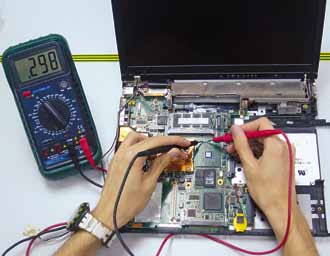Looking for a job today, that too in one of the core industries, in the current environment seems like an uphill task. Even among those who have a job, there will be a handful who would like to start off something of their own. This article discusses the options that are open to fresh engineering graduates, and to those who are skilled but want to quit their current jobs to start a venture of their own. The article focuses on the field of elecronics with respect to manufacturing, assembly and repairs.
Can an engineer be an entrepreneur?
At a time when fnding an occupation is hard, the sensible option (which is actually being pursued by many) after graduation would be to either study further or start your own business, which can be one of the hardest, most challenging and demanding options. Besides, success in business is hardly ever guaranteed. Having said that, it can also be one of the most rewarding endeavours, both financially and professionally.
According to a survey, people with engineering qualifications are more likely to run a business than those with an MBA. Engineers with the right mix of a technical background and entrepreneurial abilities have a good chance of starting projects of their own. With job uncertainty increasing by the day, entrepreneurship is now a good option to consider. So, the question is: Can an engineer be a successful entrepreneur?
Yes, believes Vinay Chaddha, CTO, GVC Systems Pvt Ltd. He says, “All a person needs is guts; everything else will fall in place. But I assume that readers would be interested in starting a micro-sized or a small enterprise, rather than starting a large-scale organisation, for which they need to be financially sound.”
Ganesh Shankar, managing director of FluxGen Engineering Technologies, which is a start-up, says, “In my opinion, engineers with a business idea should ideally ask themselves the following questions: ‘Why do I want to start a business?’, ‘Who will be my immediate customers?’, ‘Who will be my end customers?’ and, ‘What are my skill sets—do I have, at least, the basic skills to start working towards the business?’ If the motivation is strong, the rest will most likely fall in place.”
The first step
Sharing his views on the important first step in starting a business, Vinay Chaddha says, “They should know their skills really well. The most critical thing in the field of entrepreneurship is to understand your own skills and, more importantly, whether people will be willing to pay for your skills or not. Personally, I have been through all the stages—repairing, designing and manufacturing. If aspiring entrepreneurs can understand their strengths, whether in the field of manufacturing, repairing or designing, they should go for it.”
The first step is generally the toughest of all, and it can be exceedingly intimidating and discouraging for inexperienced graduates trying to compete against multinational companies. But consider this quote by Donald Trump: “If you’re going to be thinking, you may as well think big.”
So the first step is always about your concept—your idea of what the enterprise will be about, what it should be, how it should develop its products, its cost points, how it should operate within its environment, etc. It is very important that you feel confident aout your idea, as this will help you to work harder towards being successful. A good understanding of commerce will certainly help. And don’t think about the big companies in the domain—just focus on your plan!
Where do you belong?
With over 25 years of industry experience, Ganapathy Subramaniam, ex-CEO of Cosmic Circuits and presently a consultant to many ESDM companies, shares his views, saying, “According to me, manufacturing, design and assembly within the field of electronic is largely a part of the ESDM (electronic system design & manufacturing) sector. Hence, the upcoming start-up firms that aim to concentrate on that domain may well be classified into two categories.” He adds, “One is the highly innovative, global market kind of a company. These organisations come up with a brand new idea and commercialise it. The other type of company is one that builds something over an existing idea. Both the product and the market for it exist globally, and Indian start-ups localise the idea for the domestic market.”
So first, engineers must decide which category they belong to. Subramaniam says, “I would, in all probability, counsel the student community to consider the first category because they are not confined to any boundaries or routine patterns initially, and they can start to create something world-class. The second option could be for people who might not have great innovative ideas but are talented and are willing to take the risk of investing. To be successful with the second option, it does require expertise within the industry,” he further adds.
The engineer with a plan
A business plan is one of the most important documents to have. It is definitely a crucial tool in attracting investors. Coming up with a business plan is of utmost importance, so that you understand exactly where you ought to be at a particular point in time and what you should be doing. V. Sunder, MD and CEO, Ma Foi Connecting Dots Advisory Pvt Ltd, has over 25 years of rich experience in the areas of banking, financial services, manufacturing, design and engineering services. He believes that having a business plan is critical, as it structures the entrepreneurs’ thinking, prompts them to plan for the future and helps them ensure they have covered all the important areas. He says, “The plan can be broken down into a short-term and long-term plan, and aligned with the business goals.”
Yes, money matters. So collect as much of capital as possible and use it wisely. You need to plan the financial aspects very thoroughly—how much money needs to go into which area, for instance. Be cautious, but don’t be tongue-tied when it comes to making enquiries or speaking up when validating your ideas with industry experts or seniors. Don’t give up if the business fails or doesn’t work out as well as you had expected. Learn from your mistakes and move on.
Vinay Chaddha has an interesting take on the capital required for starting a business in the field of electronics. He says, “All the entrepreneurs that I am aware of personally have started off with zero or negligible capital. There are customers willing to pay money, provided they are satisfied with the quality of work. I have four freshers working with me, and I am ready to pay them—provided I am satisfied with the quality of work done by them.” He adds, “In electronics, there is not much of an investment required. Consider the example of PCB designing. Almost every engineering graduate has a laptop and Internet connection. They can easily start to work from home.”
Experience before entrepreneurship?
One issue that the graduating engineering students definitely lack is experience. Subramaniam says, “It isn’t that they’ll blindly start an organisation. But in India, a very small proportion of the companies started by the student community are successful and most of the failures are because of a lack of understanding. Students must first put in a lot of thought into their plan, asking themselves if it is sufficienly different from the competition to take it to a larger scale.” At the same time, Subramaniam believes that the engineering students are the only ones who are going to come up with path-breaking ideas since they are not bound by any limitations. Hence, one thing that engineers should do if they’re planning to opt for the first category of business is to validate their ideas with experienced people who have built successful firms and have a good network with venture capitalists, because if it is a bright idea, funding will surely be quick.

Subramaniam adds, “Another important thing would be to form a good team, and getting the right mix of people from various backgrounds. Since the majority of the team will largely be technical, it’s very important to consider the financial and marketing aspects of the firm as well.” Unfortunately, many students do not pay attention to aspects other than the technical. He adds, “They might have a great product in mind; however, they would not be able to answer queries like who they plan to sell to, how they plan to market the product, how to finance their project, or even how to go about manufacturing the product. Therefore it is better to first give it a lot of thought, answer all these questions and when everything is in place, they can go ahead with the project.”
On the other hand, after all the thinking, if the students feel they lack the answers to any or all of these questions, it would be better for them to join a promising start-up. They must attempt to take on maximum responsibility for at least a couple of years because it is easy to learn or answer all the questions in one’s mind at a start-up, believes Ganapathy Subramaniam. He says, “In fact, the team members must each try to take on more responsibilities, juggling multiple job functions. If they were a part of an out-sized multinational company, they’d in all probability not get adequate exposure for their future business. I strongly advise students, curious about entrepreneurship as a career, to look for promising start-ups and take the maximum responsibility they can.”
So the right thing to do would be to understand the gaps in your business plan, try to fill these gaps with the help of seniors and industry experts, and then validate your idea and venture out to start the company. Subramaniam says, “When Apple, for instance, introduced the iPod, it wasn’t that MP3 players didn’t exist at that time. It required a pioneer like Steve Jobs to sell it, and Apple’s top team to innovate on many features including the look and feel.”
Sharing his experience, Chaddha says, “Normally what has been happening with most engineering graduates since the last four-five years is that they settle for IT jobs. Joining IT companies will definitely not give them the right exposure to be entrepreneurs at a later stage. I know at least 20 fresh engineering graduates who have started their own businesses while managing their graduation.” He adds, “I would recommend engineers to work in a start-up in their second or third year itself as interns and understand the environment. Then they can start on their own immediately after they graduate, or even before that. But yes, they defnitely do need some experience, which they can acquire only by working in a good start-up rather than a large organisation.”
Ganesh Shankar shares his belief, “I think it is certainly beneficial to seek employment first (prior to launching a start-up) so as to get first-hand experience in problem solving in the industry, upgrade both technical and non-technical skills, and also build contacts in the supply chain. The bottom line is: Who is going to spend on the learning (read: mistakes) when you start your career? If you start a business right away, you have to pay for the learning yourself.”
Is it worth the effort?
“Honestly, looking at the current employment figures, there is hardly any choice,” believes Chaddha. He adds, “A recent article that I came across reported that 1.5 million engineers graduate every year, and only 150,000 jobs are available in large companies. So, the remaining engineers are either going to join a start-up, become entrepreneurs, or prepare for GATE and pursue a master’s degree. Honestly speaking, even after the completion of their master’s degree, most students are again in the same kind of situation.”
So the bottom line is they need to have skills and guts. Chaddha says, “If you are looking for a very secure and stable life, yes, go ahead with a job. But if you want to be an entrepreneur, the instability and insecurity is definitely high initially, but it’s much more fun.”
Many students give up early. They must have patience and believe in their idea, feels Subramaniam. He says, “They shouldn’t get frustrated, because it’s going to be a tough journey, but the rewards will be very satisfying.” Ganesh Shankar believes it will be rewarding both financially and profesionally only if one is ready to pursue it for a long time, especially if you are talking about a business in manufacturing, repairs or assembly in the field of electronics. Making an important point, he says, “Unlike the Internet and mobile start-ups, these industries are capital intensive—you have got to get equipment, tools and assembly lines. It may take a while to break even and then make profit.
Is it a good time to start a business?
“The ESDM industry is a very large industry, even if you consider just the Indian market. If you ask me whether engineering graduates should immediately dive into it, I would say they should if they are passionate about their idea, and even though it might be risky,” says Subramaniam, who founded Cosmic Circuits.
Ganesh Shankar says, “I personally think it is a good time to start your own business. One of the most important reasons is that, we now have fast computers available at low prices, and there are many software tools freely available online or at reasonable prices. Computer-aided development is the current trend, and anyone with a strong grasp of engineering fundamentals, good creativity and some training in software can potentially design any thing under the sun.”
The pitfalls
Chaddha informs, “The biggest pitfall that I have observed is that students take their teachers too seriously. Most lecturers encourage students to settle for a job. If students take their education very seriously, this becomes their biggest hurdle. They must use their education for their own benefit and not merely to excel in terms of scoring high marks.”
V. Sunder believes entrepreneurs need to take a lot of risks. He says, “There are pitfalls and problems along the way, and it helps to have mentors, who can, in some cases, help you avoid common mistakes.” He adds, “But the biggest pitfall is surrounding oneself with the wrong people. The right people are those who are going to encourage you to keep going even if you feel like quitting.” Another pitfall is to stop learning new skills once the start-up team has started attaining some level of success, informs Sunder. Learning new skills and building on already attained skills is important to stay relevant in the market.
Ganesh Shankar says, “One of the pitfalls an engineer falls into is trying to do all the work in-house. A start-up team should concentrate on its core strengths and do only what it can provide maximum value addition to; the rest should be sub-contracted to various suppliers.”
The current advantages
There are many advantages of setting up your own business in India, believes Subramaniam. He says, “First, there’s a huge local market. Today, we are importing nearly all our electronics. So there’s a huge opportunity in terms of the local market. India is also well-recognised internationally, with regard to technical skills.” Sunder believes that today, with the power of social media and the Internet, it is possible to source funding or get across to an angel investor. He says, “Marketing and publicity can go viral, and reach out to millions or to a large customer base at a single go, which is a blessing.”
Comparing the current situation to the time when Chaddha started his business in the 90s, he feels that there are plenty of advantages for engineers today. He says, “At that time, there were many hurdles. For instance, to get Adobe Acrobat Reader, I had to pay nearly ` 8000. Today, Adobe Reader comes free of cost. Another instance was when I bought my first compiler—I had to pay US$ 4000. Today, if you go to Freescale’s website, you can easily download its compiler free of cost.” He adds, “Those days, I had to first convince my customer to believe in my ideas, and based on that I used to borrow money to execute them. Today, things are much cheaper. But on the flip side, since lots of engineers graduate every year, there is more competition. When I started my business in embedded electronics, there were very few people in the field because costs were pretty high. You needed at least US$ 10,000 to start developing your own products. Today, Texas Instruments sells one of its kits for just $ 5. Thank the Internet for the low-cost resources available today.”
Chaddha informed that for his first design, however, he was able to get the development board and all related software on loan from Freescale (it was Motorola at that time) and he made his first product at almost zero cost.
A few ideas for the business you may want to start
Servicing of office electronics equipment. This seems like a successful business idea that does not require any investment until you start expanding. The target could be small and medium business firms, since they might not have the time to repair or service their electronics equipment. With a small servicing kit, regular servicing can be offered, so that it becomes a long-term profitable business.
Electronics/PCB components assembly. This is a work-from-home, minimal investment freelance option, where you can offer electronics assembly services to local low-cost business and consumer electronics products. You could definitely expand later on.
PCB CAD design services. This is a minimal investment freelance job that allows you to work from home, and there is a possibility of growing in the future. You can offer electronics PCB CAD design services to small companies and professionals who cannot maintain in-house PCB CAD design tools and resources.
The power-supply equipment business. The demand for power supply regulation and energy storage has been growing. You can design and build your own power supply products (UPS systems, inverters, SMPS, etc) and sell them to individual customers. Servicing these power supply equipment will provide a good profit after the warranty period has expired.
Designing and manufacturing electronics home appliances. This is a very good home business opportunity—you can choose a good low-cost home appliance solution like an electronic mosquito killer, electronic healthcare gadget, etc.
Cell-phone service and repairs. There are good opportunities for repairing or recycling old mobile phones and selling them at cheaper prices.
Computer and laptop repairs. This is an easy-to-set up business as the computers and laptops are built with easily-replaceable PC boards and modules. You can earn more money in less time.
Power electronics appliance service and repairs. This is a continually growing business opportunity with the increasing number of electronic appliances in homes. These appliances are expensive, and have to be constantly serviced or repaired before they reach their end of life.
Electronic products and components supply chain management. With the wholesale purchase of electronic products and their service components, and their distribution to retail suppliers, you can make good money with less investment, as no expensive infrastructure is required.
Building or installation of home solar power generation equipment. You can learn the basics of solar power systems and how to install them, and then start winning contracts with just an installation tool-kit.
Research and development. Use your advanced knowledge in circuitry to test and create products that you can sell with your own research and development firm, or that companies can hire for unbiased test results and consultations. You could work with green building products, machinery controls, navigation systems, communication systems, wiring systems and lighting products.
Maintenance and repair. Electrical and electronics engineers develop the circuitry inside electronic equipment and vehicles, and this knowledge can serve others who require maintenance and repairs. For example, if you specialise in the electrical components in automobiles, you can contract your services to a car manufacturer that wants to fix a never-before-seen sound system that is not performing well in its latest line of cars.
Printed circuit boards. One of the most important components within an electronic product is the circuit board. Using your skills, you can design and sell printed circuit boards to manufacturing companies, construction firms and engineering firms that do not specialise in electrical engineering. By purchasing special automated equipment, you can design and print a large number of circuit boards for clients who require such boards.
(Courtesy: www.electronicsbus.com & http://smallbusiness.chron.com)
According to an online study, over 75 per cent of respondents believe it is important to look for information about people and their organisation before doing business with them. So it would not be wrong to say that an online presence must be considered whilst setting up a start-up. Chaddha believes it is a must. He says, “There is no way anyone can do business without having an online presence. If someone has to find out anything about you the first thing that he or she will do is to look up the Internet.”
Sunder says, “If you are not easily found on the Internet, your customers will never find you.” Subramaniam adds, “Branding is definitely very important. Unless your company is on the stealth mode, in which case one does not want to reveal too many details about an idea or product, I would say an online presence is very important.”
Talking about government help for start-ups, Chaddha elaborates, “There is a government entity called NIESBUD in Noida, where I have been invited a few times to speak about entrepreneurship to students of several colleges. The government of India is anchoring and mentoring students to start their own businesses and it has continuously been conducting courses for them. There are plenty of (business) incubators coming up. I’m sure there are quite a few in Bengaluru also, although I don’t have a clear idea about them. But in Delhi, there are colleges with incubators where their students, as well as students from different colleges, are encouraged to work together. There are some schemes available where the government lends a small amount of money, though there is a lot of bureaucracy with respect to this.”
This information is just the tip of the iceberg with regard to all that entrepreneurs need to know about getting a business off the ground, so break out of your comfort zone and learn as much as you can about the field you are getting into. Believing that nothing can prepare young people better for success than a strong math and science background, President Obama also noted that “…the most common course of study for S&P’s (Standard & Poor) 500 CEOs was not business, finance or economics, but engineering.”
The author is a tech correspondent at EFY Bengaluru







